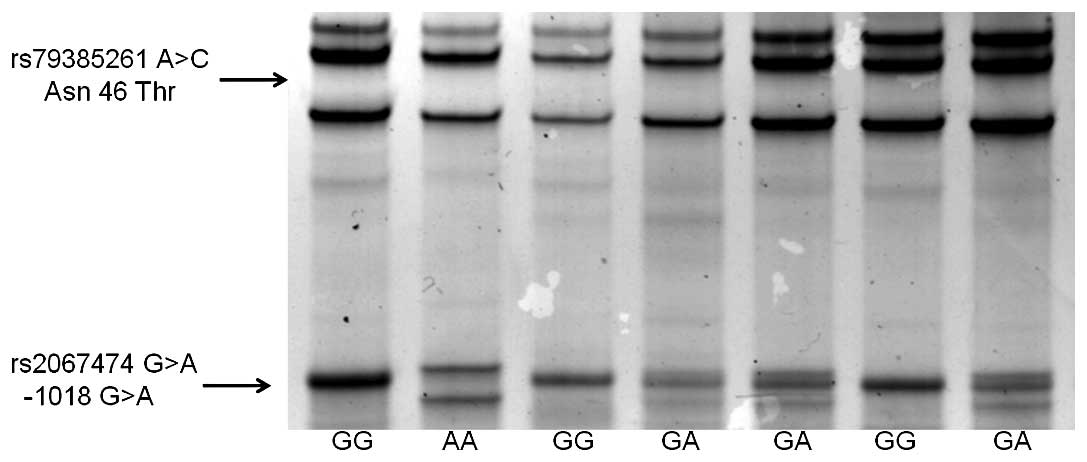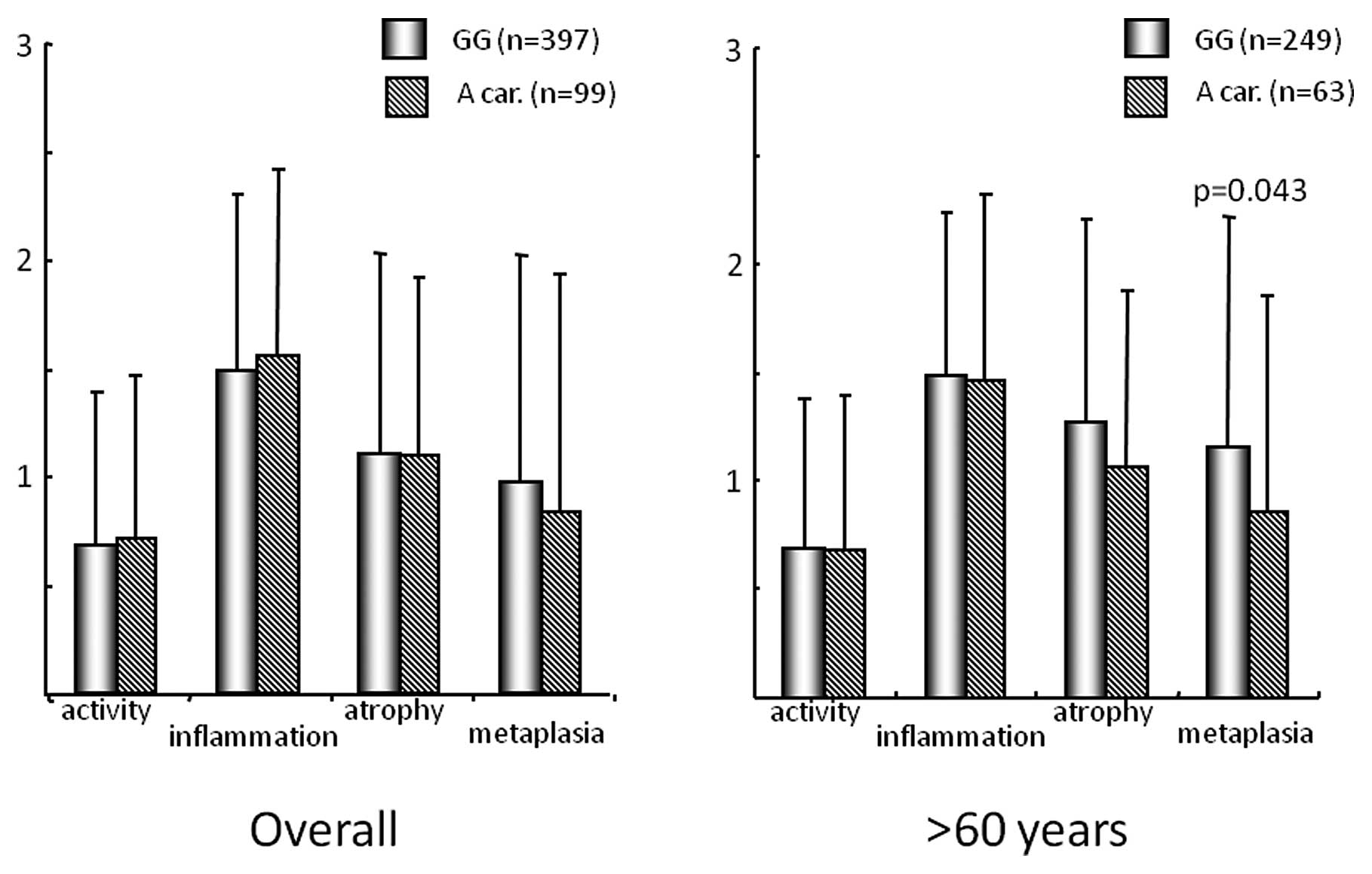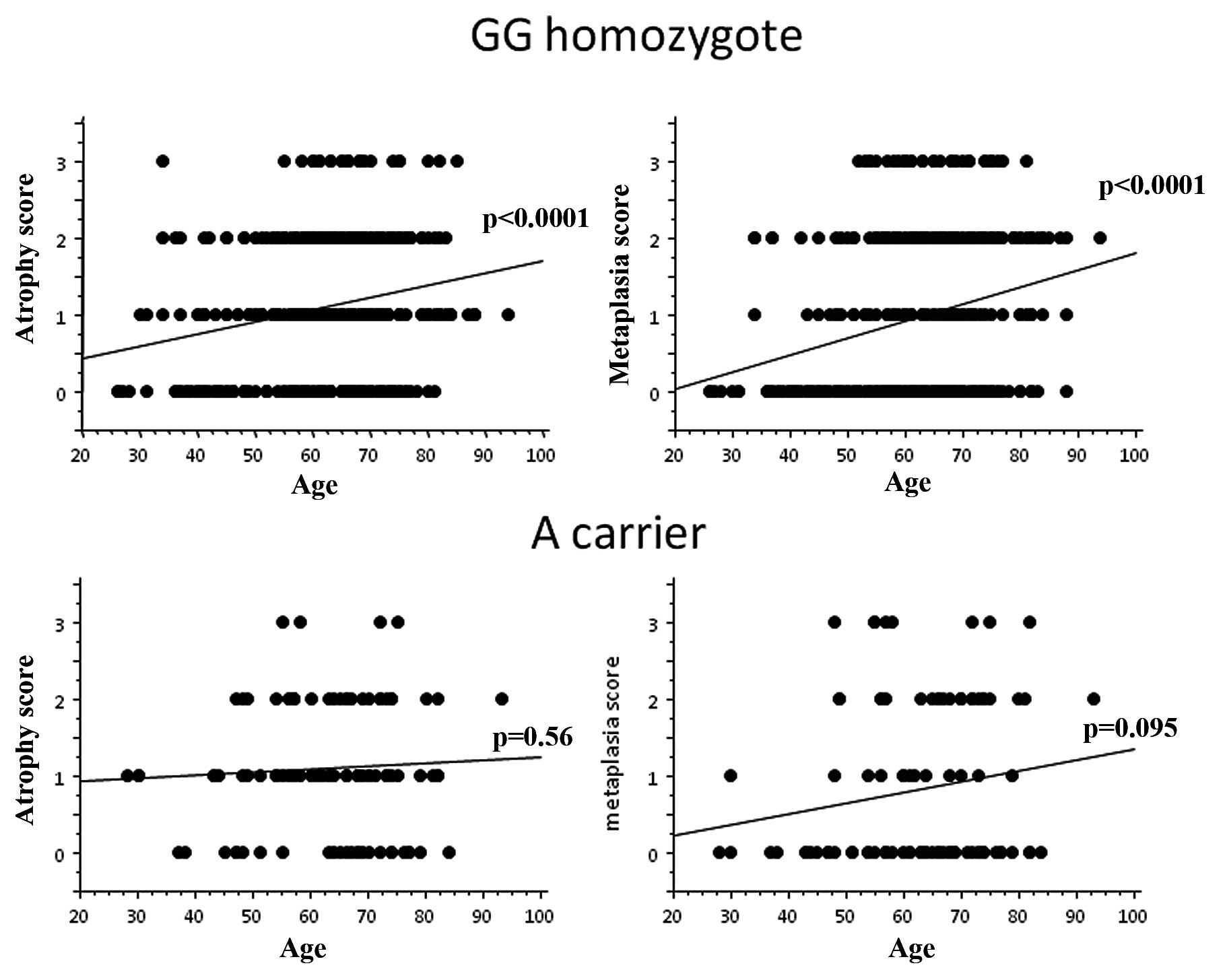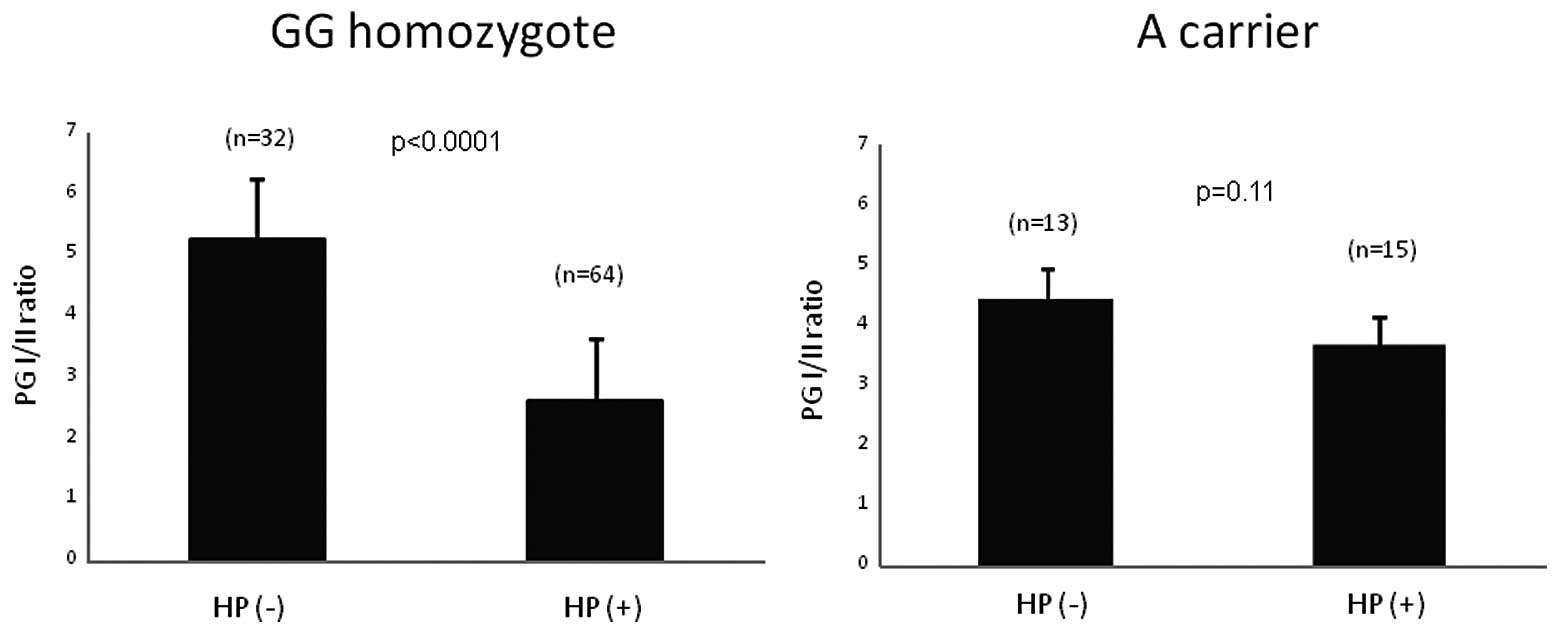|
1
|
Murray CJ and Lopez AD: Global mortality,
disability, and the contribution of risk factors: Global Burden of
Disease Study. Lancet. 349:1436–1442. 1997. View Article : Google Scholar : PubMed/NCBI
|
|
2
|
Parkin DM, Bray F, Ferlay J and Pisani P:
Global cancer statistics, 2002. CA Cancer J Clin. 55:74–108. 2002.
View Article : Google Scholar
|
|
3
|
Correa P: Human gastric carcinogenesis: a
multistep and multifactorial process. First American Cancer Society
Award Lecture on Cancer Epidemiology and Prevention. Cancer Res.
52:6735–6740. 1992.
|
|
4
|
Suerbaum S and Michetti P: Helicobacter
pylori infection. N Engl J Med. 347:1175–1186. 2002. View Article : Google Scholar : PubMed/NCBI
|
|
5
|
Covacci A, Telford JL, Del GG, Giudice GD,
Parsonnet J and Rappuoli R: Helicobacter pylori virlence and
genetic geography. Science. 284:1328–1333. 1999. View Article : Google Scholar : PubMed/NCBI
|
|
6
|
Uemura N, Okamoto S, Yamamoto S, et al:
Helicobacter pylori infection and development of gastric cancer. N
Engl J Med. 345:784–789. 2001. View Article : Google Scholar
|
|
7
|
El-Omar EM, Carrington M, Chow WH, et al:
Interleukin-1 polymorphisms associated with increased risk of
gastric cancer. Nature. 404:398–402. 2000. View Article : Google Scholar : PubMed/NCBI
|
|
8
|
Furuta T, El-Omar EM, Xiao F, Shirai N,
Takashima M and Sugimura H: Interleukin 1β polymorphisms increase
risk of hypochlorhydria and atrophic gastritis and reduce risk of
duodenal ulcer recurrence in Japan. Gastroenterology. 123:92–105.
2002.
|
|
9
|
Machado JC, Figueiredo C, Canedo P, et al:
A proinflammatory genetic profile increases the risk for chronic
atrophic gastritis and gastric carcinoma. Gastroenterology.
125:364–371. 2003. View Article : Google Scholar : PubMed/NCBI
|
|
10
|
Ohyauchi M, Imatani A, Yonechi M, et al:
The polymorphism interleukin 8–251 A/T influences the
susceptibility of Helicobacter pylori related gastric diseases in
the Japanese population. Gut. 54:330–335. 2005.
|
|
11
|
Ohmiya N, Taguchi A, Mabuchi N, et al:
MDM2 promoter polymorphism is associated with both an increased
susceptibility to gastric carcinoma and poor prognosis. J Clin
Oncol. 24:4434–4440. 2006. View Article : Google Scholar : PubMed/NCBI
|
|
12
|
Tahara T, Arisawa T, Wang F, et al:
Toll-like receptor 2 -196 to 174del polymorphism influences the
susceptibility of Japanese people to gastric cancer. Cancer Sci.
98:1790–1794. 2007. View Article : Google Scholar : PubMed/NCBI
|
|
13
|
Arisawa T, Tahara T, Shibata T, et al:
Functional promoter polymorphisms of the macrophage migration
inhibitory factor gene in gastric carcinogenesis. Oncol Rep.
19:223–228. 2008.PubMed/NCBI
|
|
14
|
Shibata T, Tahara T, Hirata I and Arisawa
T: Genetic polymorphism of interleukin-17A and -17F genes in
gastric carcinogenesis. Hum Immunol. 70:547–551. 2009. View Article : Google Scholar : PubMed/NCBI
|
|
15
|
Okubo M, Tahara T, Shibata T, et al:
Association between common genetic variants in pre-microRNAs and
gastric cancer risk in Japanese population. Helicobacter.
15:524–531. 2010. View Article : Google Scholar : PubMed/NCBI
|
|
16
|
Chen D, Aihara T, Zhao CM, Hakanson R and
Okabe S: Differentiation of the Gastric Mucosa I. Role of histamine
in control of function and integrity of oxyntic mucosa: 1.
understanding gastric physiology through disruption of targeted
genes. Am J Physiol Gastrointest Liver Physiol. 291:G539–G544.
2006. View Article : Google Scholar : PubMed/NCBI
|
|
17
|
Rangachari PK: Histamine: mercurial
messenger in the gut. Am J Physiol. 262:G1–G13. 1992.PubMed/NCBI
|
|
18
|
Hill SJ, Ganellin CR, Timmerman H, et al:
International Union of Pharmacology. XIII Classification of
histamine receptors. Pharmacol Rev. 49:253–278. 1997.PubMed/NCBI
|
|
19
|
Black J, Duncan W and Durant D: Definition
and antagonism of histamine H2-receptors. Nature. 236:385–390.
1972. View
Article : Google Scholar : PubMed/NCBI
|
|
20
|
Jones DB, Howden CW, Burget DW, et al:
Acid suppression in duodenal ulcer: a meta-analysis to define
optimal dosing with antisecretory drugs. Gut. 28:1120–1127. 1987.
View Article : Google Scholar : PubMed/NCBI
|
|
21
|
Marshall BJ and Warren JR: Unidentified
curved bacilli in the stomach of patients with gastritis and peptic
ulcer. Lancet. 1:1311–1315. 1984. View Article : Google Scholar : PubMed/NCBI
|
|
22
|
McColl KEL, El-Omar E and Gillen D:
Interactions between H. pylori infection, gastric acid secretion
and anti-secretory therapy. Br Med Bull. 54:121–138. 1998.
View Article : Google Scholar : PubMed/NCBI
|
|
23
|
Courillon-Mallet A, Launay JM, Roucayrol
AM, et al: Helicobacter pylori infection: physiopathologic
implication of N-methylhistamine. Gastroenterology. 108:959–966.
1995. View Article : Google Scholar : PubMed/NCBI
|
|
24
|
McGowan CC, Cover TL and Blaser MJ:
Helicobacter pylori and gastric acid: biological and therapeutic
implications. Gastroenterology. 110:926–938. 1996. View Article : Google Scholar : PubMed/NCBI
|
|
25
|
Bodger K and Crabtree JE: Helicobacter
pylori and gastric inflammation. Br Med Bull. 54:139–150. 1998.
View Article : Google Scholar : PubMed/NCBI
|
|
26
|
Mancama D, Arranz MJ, Munro J, et al:
Investigation of promoter variants of the histamine 1 and 2
receptors in schizophrenia and clozapine response. Neurosci Lett.
333:207–211. 2002. View Article : Google Scholar : PubMed/NCBI
|
|
27
|
Garcia-Martin E, Ayuso P, Luengo A,
Martinez C and Agundez JAG: Genetic variability of histamine
receptors in patients with Parkinson's disease. BMC Med Genet.
9:152008.PubMed/NCBI
|
|
28
|
Arisawa T, Tahara T, Shibata T, et al: The
influence of polymorphisms of interleukin-17A and interleukin-17F
genes on the susceptibility to ulcerative colitis. J Clin Immunol.
28:44–49. 2008. View Article : Google Scholar : PubMed/NCBI
|
|
29
|
Dixon MF, Genta RM, Yardley JH and Correa
P: Classification and grading of gastritis: the updated Sydney
system. Am J Surg Pathol. 20:1161–1181. 1996. View Article : Google Scholar : PubMed/NCBI
|
|
30
|
Kang GH, Shim YH, Jung HY, Kim WH, Ro JY
and Rhyu MG: CpG island methylation in premalignant stages of
gastric carcinoma. Cancer Res. 61:2847–2851. 2001.PubMed/NCBI
|
|
31
|
Pestov DG, Strezoska Z and Lau LF:
Evidence of p53-dependent cross-talk between ribosome biogenesis
and the cell cycle: effects of nucleolar protein Bop1 on G(1)/S
transition. Mol Cell Biol. 21:4246–4255. 2001. View Article : Google Scholar : PubMed/NCBI
|
|
32
|
Ito C, Morisset S, Krebs MO, et al:
Histamine H2 receptor gene variants: lack of association with
schizophrenia. Mol Psychiatry. 5:159–164. 2000. View Article : Google Scholar : PubMed/NCBI
|
|
33
|
Fox JG, Rogers AB, Ihrig M, et al:
Helicobacter pylori-associated gastric cancer in INSGAS mice is
gender specific. Cancer Res. 63:942–950. 2003.PubMed/NCBI
|
|
34
|
Wang TC, Dangler CA, Chen D, et al:
Synergistic interaction between hypergastrinemia and Helicobacter
infection in a mouse model of gastric cancer. Gastroenterology.
118:36–47. 2000. View Article : Google Scholar : PubMed/NCBI
|
|
35
|
Kuipers EJ, Uyterlinde AM, Pena AS, et al:
Increase of Helicobacter pylori-associated corpus gastritis during
acid suppressive therapy: implications for long-term safety. Am J
Gastroenterol. 90:1401–1406. 1995.PubMed/NCBI
|
|
36
|
Kuipers EJ, Lundell L, Klinkenberg-Knol
EC, et al: Atrophic gastritis and Helicobacter pylori infection in
patients with reflux esophagitis treated with omeprazole or
fundoplication. N Engl J Med. 334:1018–1022. 1996. View Article : Google Scholar : PubMed/NCBI
|
|
37
|
Berstad AE, Hatlebakk JG, Maartmann-Moe H,
Berstad A and Brandtzaeg P: Helicobacter pylori gastritis and
epithelial cell proliferation in patients with reflux esophagitis
after treatment with lansoprazole. Gut. 41:740–747. 1997.
View Article : Google Scholar : PubMed/NCBI
|
|
38
|
Takaishi S, Cui G, Frederick DM, et al:
Synergistic inhibitory effects of gastrin and histamine receptor
antagonists on Helicobacter-induced gastric cancer.
Gastroenterology. 128:1965–1983. 2005. View Article : Google Scholar : PubMed/NCBI
|
|
39
|
Poynter D and Selway SA: Neuroendocrine
cell hyperplasia and neuroendocrine carcinoma of the rodent fundic
stomach. Mutat Res. 248:303–319. 1991. View Article : Google Scholar : PubMed/NCBI
|
|
40
|
Brenna E, Swarts HG, Klaassen CH, De Pont
JJ and Waldum HL: Evaluation of the trophic effect of longterm
treatment with the histamine H2 receptor antagonist loxtidine on
rat oxyntic mucosa by differential counting of dispersed cells.
Gut. 35:1547–1550. 1994. View Article : Google Scholar : PubMed/NCBI
|
|
41
|
Cui G, Takaishi S, Ai W, et al:
Gastrin-induced apoptosis contributes to carcinogenesis in the
stomach. Lab Invest. 86:1037–1051. 2006. View Article : Google Scholar : PubMed/NCBI
|
|
42
|
Hunyady B, Zolyomi A, Czimmer J, et al:
Expanded parietal cell pool in transgenic mice unable to synthesize
histamine. Scand J Gastroenterol. 38:133–140. 2003.PubMed/NCBI
|
|
43
|
Ohtsu H and Watanabe T: New functions of
histamine found in histidine decarboxylase gene knockout mice.
Biochem Biophys Res Commun. 305:443–447. 2003. View Article : Google Scholar : PubMed/NCBI
|
|
44
|
Fukushima Y, Matsui T, Saitoh T, et al:
Unique roles of G protein-coupled histamine H2 and gastrin
receptors in growth and differentiation of gastric mucosa. Eur J
Pharmacol. 502:243–252. 2004. View Article : Google Scholar : PubMed/NCBI
|
|
45
|
Lauren P: The two histologic main types of
gastric carcinoma: diffuse and so-called intestinal type carcinoma.
An attempt at a histo-clinical classification. Acta Pathol
Microbiol Scand. 64:31–49. 1965.PubMed/NCBI
|
|
46
|
Go MF: Review article: natural history and
epidemiology of Helicobacter pylori infection. Aliment Pharmacol
Ther. 16:3–15. 2002. View Article : Google Scholar : PubMed/NCBI
|
|
47
|
Tonnesen H, Knigge U, Bulow S, et al:
Effect of cimetidine on survival after gastric cancer. Lancet.
2:990–992. 1988. View Article : Google Scholar : PubMed/NCBI
|
|
48
|
Griswold DE, Alessi S, Badger AM, Poste G
and Hanna N: Inhibition of T suppressor cell expression by
histamine type 2 (H2) receptor antagonists. J Immunol.
132:3054–3057. 1984.PubMed/NCBI
|
|
49
|
Kikuchi Y, Oomori K, Kizawa I and Kato K:
Augmented natural killer activity in ovarian cancer patients
treated with cimetidine. Eur J Cancer Clin Oncol. 22:1037–1043.
1986. View Article : Google Scholar : PubMed/NCBI
|
|
50
|
Watson SA, Wilkinson LJ, Robertson JR and
Hardcastle JD: Effect of histamine on the growth of human
gastro-intestinal tumours: reversal by cimetidine. Gut.
34:1091–1096. 1993. View Article : Google Scholar : PubMed/NCBI
|


















